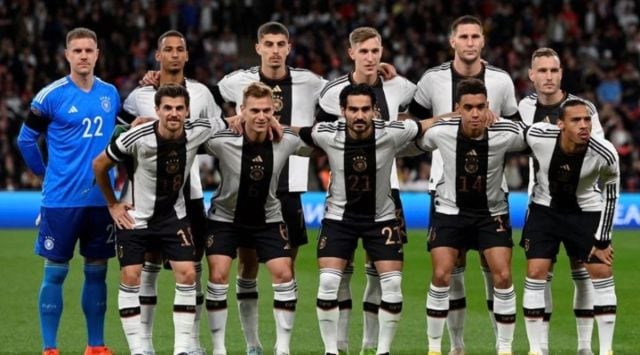“The Future of Football in Germany: Navigating Tradition, Technology, and Global Competition
Related Articles The Future of Football in Germany: Navigating Tradition, Technology, and Global Competition
The Future of Football in Germany: Navigating Tradition, Technology, and Global Competition

German football, or Fußball as it’s affectionately known, holds a revered position in the global sporting landscape. Its history is rich with iconic victories, tactical innovations, and a passionate fan base that rivals any other nation. From the "Wunderteam" of the 1950s to the dominant squads of the 1970s and the 2014 World Cup triumph, Germany has consistently been a force to be reckoned with. However, the landscape of football is constantly evolving, and Germany faces both exciting opportunities and significant challenges as it navigates the future. This article will explore the key aspects shaping the future of German football, focusing on youth development, technological advancements, the influence of globalization, and the ongoing quest to maintain its competitive edge on the world stage.
The Bedrock: Youth Development and the Next Generation of Talent
Germany’s success in football has always been underpinned by a robust youth development system. Following the disappointing performances at Euro 2000, the German Football Association (DFB) embarked on a comprehensive overhaul of its youth academies. This investment has yielded a generation of talented players who have consistently competed at the highest level.
The DFB’s talent promotion program focuses on several key principles:
- Early Identification and Training: Identifying promising players at a young age and providing them with specialized training from qualified coaches.
- Holistic Development: Emphasizing not only technical skills but also tactical understanding, physical fitness, and mental resilience.
- Individualized Training Plans: Tailoring training programs to meet the specific needs and potential of each player.
- Strong Academy Infrastructure: Ensuring that youth academies have access to state-of-the-art facilities, equipment, and coaching staff.
- Integration with Professional Clubs: Fostering close relationships between youth academies and professional clubs, allowing young players to seamlessly transition into the first team.
While the current system has been successful, there are continuous efforts to refine and improve it. One area of focus is to address the perceived decline in traditional German virtues such as fighting spirit and tactical discipline. Coaches are increasingly emphasizing these qualities alongside technical skills, aiming to produce well-rounded players who are both talented and mentally strong.
Another challenge is to ensure that young players are given opportunities to play regularly at the highest level. While some clubs are committed to giving youth players a chance, others are more hesitant, preferring to rely on established players. The DFB is working to create a culture where clubs are encouraged to invest in youth development and provide young players with the platform to showcase their talent.
Technology’s Transformative Impact: Data Analytics, Performance Tracking, and Fan Engagement
Technology is rapidly transforming every aspect of football, and Germany is at the forefront of these advancements. From data analytics to performance tracking and fan engagement, technology is playing an increasingly important role in shaping the future of the game.

- Data Analytics: Clubs are using data analytics to gain insights into player performance, opponent tactics, and match strategies. This data is used to make informed decisions about player selection, training methods, and tactical adjustments.
- Performance Tracking: Wearable technology and video analysis are used to track player movements, physical exertion, and technical skills. This data is used to optimize training programs and improve player performance.
- Virtual Reality (VR) and Augmented Reality (AR): VR and AR technologies are being used to create immersive training experiences for players and engaging experiences for fans.
- Fan Engagement: Technology is being used to enhance the fan experience, providing fans with access to real-time data, interactive content, and personalized experiences. Social media platforms are also playing a crucial role in connecting fans with their favorite teams and players.
German clubs are increasingly investing in technology to gain a competitive edge. Bayern Munich, for example, has a dedicated data analytics department that works closely with the coaching staff to provide insights into player performance and opponent tactics. Borussia Dortmund has invested heavily in wearable technology to track player movements and physical exertion during training and matches.
The DFB is also embracing technology to improve the quality of refereeing. Video Assistant Referee (VAR) technology has been implemented in the Bundesliga to help referees make more accurate decisions. While VAR has been controversial at times, it has generally been seen as a positive step towards ensuring fair play.
Globalization’s Influence: A More Diverse and Competitive Landscape
Globalization has had a profound impact on German football, both on and off the field. The influx of foreign players has enriched the Bundesliga, bringing new styles of play and tactical approaches. However, it has also raised concerns about the impact on German players and the national team.
The Bundesliga is now one of the most diverse leagues in the world, with players from all corners of the globe. This has led to a more exciting and competitive league, as teams are forced to adapt to different styles of play. However, it has also raised concerns about the number of opportunities available for German players.
The DFB is working to address this issue by implementing rules that require clubs to field a certain number of German players in their squads. This is intended to ensure that German players continue to have opportunities to develop and compete at the highest level.
Globalization has also had an impact on the financial side of German football. The Bundesliga is now one of the most commercially successful leagues in the world, attracting significant investment from sponsors and broadcasters. This has allowed German clubs to invest in better facilities, coaching staff, and players.
However, the increasing commercialization of football has also raised concerns about the impact on the fan experience. Some fans feel that the focus on money is eroding the traditional values of the game.
Maintaining Competitive Edge: Challenges and Strategies
Despite its rich history and strong infrastructure, German football faces several challenges as it seeks to maintain its competitive edge on the world stage.
- Increased Competition: The rise of other European leagues, such as the English Premier League and the Spanish La Liga, has increased competition for top players and coaches.
- Financial Disparities: The financial disparities between the top clubs and the smaller clubs in the Bundesliga are growing, making it difficult for the smaller clubs to compete.
- Changing Playing Styles: The game of football is constantly evolving, and German football needs to adapt to new playing styles and tactical approaches.
- Maintaining Fan Engagement: As the game becomes more commercialized, it is important to maintain fan engagement and ensure that the fan experience remains positive.
To address these challenges, the DFB and the Bundesliga are implementing a number of strategies:
- Investing in Youth Development: Continuing to invest in youth development to ensure that Germany produces a steady stream of talented players.
- Promoting Tactical Innovation: Encouraging coaches to experiment with new tactical approaches and playing styles.
- Strengthening Financial Fair Play Regulations: Implementing stricter financial fair play regulations to ensure that clubs are financially sustainable.
- Enhancing Fan Engagement: Working to enhance the fan experience by providing fans with access to real-time data, interactive content, and personalized experiences.
- Promoting German Football Abroad: Actively promoting German football abroad to attract new fans and sponsors.
Conclusion: A Bright Future with Calculated Adaptations
The future of German football is bright, but it requires a proactive and adaptive approach. By continuing to invest in youth development, embracing technology, navigating the challenges of globalization, and implementing strategies to maintain its competitive edge, German football can ensure that it remains a dominant force in the global game for many years to come. The challenge lies in balancing the preservation of traditional values with the need to innovate and adapt to the ever-changing landscape of modern football. This delicate balance will ultimately determine the long-term success and sustainability of German football. The dedication of the DFB, the passion of the fans, and the commitment of the clubs all point towards a future where German football continues to thrive and inspire.
